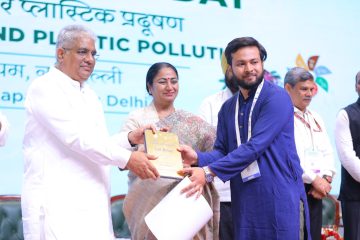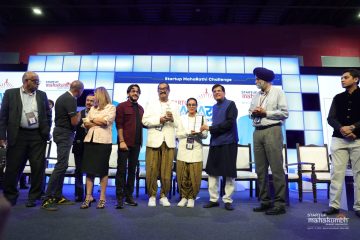
Business Standard NDTV ABP News Millennium Post Navbharat Times ABP News Twitter
At Porapara, an IIT Kharagpur initiative has become a unique model of participatory civic management
Porapara is a tribal hamlet around 15 kilometres away from IIT Kharagpur. It has seen several initiatives from the academic community of IIT Kharagpur, which has set up a primary school and has also tried to install smokeless chulas for the convenience of the villagers. The people of the village are mainly daily wage labourers, working in the surrounding agricultural fields or sometimes in Kharagpur town. Having grown used to the community of IIT Kharagpur, they are not averse to the entry of those who can easily be branded ‘outsiders’. Yet, they do not easily embrace change.
This was evident to Prof. Somnath Ghosal, Assistant Professor of Rural Development at IIT Kharagpur. It was his ‘dream’ to build/implement a project that involved community participation. For a region with perennial water problem, it wasn’t difficult to identify what project would benefit the people. Prof. Ghosal worked hard to convince the villagers of the need to build a water filtration unit even though there were frequent cases of water-related diseases. The diseases took a heavy toll on the health of the villagers, who had to shell out hundreds of rupees for treatment every month.
“Once the villagers were convinced,” says Prof. Ghosal, “they came forward to help spontaneously.” Kshitij Mahato donated the land where the building that houses the filtration unit was constructed.
 Amidst the red hue of Porapara’s unpaved roads, the thatched mud houses and the green all around, the bright yellow structure of the “Multi Filtered UV Treated Drinking Water Facility” constructed by the Rural Development Centre of IIT Kharapur enjoys pride of place. This is a fully automated multi-filter water purification unit, installed by Prof. Ghosal with funds sanctioned by the Sponsored Research and Industrial Consultancy wing of the Institute. The filtration unit provides 60 families with close to 1,000 litres (15 litres per family) of purified drinking water every day at the nominal cost of Rs 1 per family.
Amidst the red hue of Porapara’s unpaved roads, the thatched mud houses and the green all around, the bright yellow structure of the “Multi Filtered UV Treated Drinking Water Facility” constructed by the Rural Development Centre of IIT Kharapur enjoys pride of place. This is a fully automated multi-filter water purification unit, installed by Prof. Ghosal with funds sanctioned by the Sponsored Research and Industrial Consultancy wing of the Institute. The filtration unit provides 60 families with close to 1,000 litres (15 litres per family) of purified drinking water every day at the nominal cost of Rs 1 per family.
What is unique about the project is not merely the technology and design of the filtration unit, but also its management. The entire operation of the unit, its upkeep and daily management, is done by the villagers who have formed three committees to manage the operations. It is thus an ‘install and forget’ arrangement. The current, and future, financial needs are to be met by the villagers from the funds collected in the form of the daily payment (Rs 1 per family per day) for the purified water.
It was not easy to bring together representatives from all 60 households when it came to decision-making. “Since they stayed away from their homes during the day on work, I had to come to the village almost every evening to talk to them,” says Prof. Ghosal. Getting the construction completed was also harrowing, particularly during the monsoons. Since Porapara has no metalled roads, commuting to the site was nightmarish.
 The memories of that struggle however cast no shadow on the crisp morning we visited the water purification unit. A small group gathered immediately on our arrival. A sheepish 17-year-old boy, Dhananjay Mahato, came forward with the keys. He has been chosen to perform a role which not too many teenagers can lay claim to. Dhananjay, together with three other youngsters, is in charge of the daily running of the filtration unit and the daily dispensing of filtered water. He starts the unit at 5.30 am every day and shuts down the operations at 8 am sharp before going to school.
The memories of that struggle however cast no shadow on the crisp morning we visited the water purification unit. A small group gathered immediately on our arrival. A sheepish 17-year-old boy, Dhananjay Mahato, came forward with the keys. He has been chosen to perform a role which not too many teenagers can lay claim to. Dhananjay, together with three other youngsters, is in charge of the daily running of the filtration unit and the daily dispensing of filtered water. He starts the unit at 5.30 am every day and shuts down the operations at 8 am sharp before going to school.
The villagers of Porapara have taken over the running and maintenance of the filtration unit completely. They maintain the apparatus, take care of cleanliness inside the filtration unit and the upkeep of the equipment. Purified water is dispensed through a vending machine which works on Rfid cards allotted to each household. Each household is entitled to one card that gives it 15 litres of water every day. The card is recharged every month with Rs 30 (Rs 1 per day) by the boys.
Filtration begins at 5.30 am and continues till 7.30 am. Water is dispensed till 8 am sharp. The boys close the unit immediately after. Three boys have been trained in the basic task of maintenance, repair and recharge operations. The filtration unit is a restricted area. Only those given prior responsibilities are allowed to gain entry into it. Even Prof. Ghosal has to seek permission to visit the facility.
There is a ‘finance committee’ consisting of three adult villagers. A single bank account has been opened in which they are the joint account holders. They have the operational rights to the account. Money obtained from the sale of purified water goes to this account. The money thus accumulated is to be used to pay for the electricity bill (expected to be around Rs 1,200), replace or repair components of the filtration unit, paint or maintain the structure.
 An advisory committee, consisting of one member from every household, usually the seniors, advises the villagers on how best to manage the filtration unit and the need for improvements. The selection of the present operation committee was done on the basis of the recommendations of the advisory committee.
An advisory committee, consisting of one member from every household, usually the seniors, advises the villagers on how best to manage the filtration unit and the need for improvements. The selection of the present operation committee was done on the basis of the recommendations of the advisory committee.
“None of this would have happened had they not placed their faith in us and trusted their own abilities,” says Prof. Ghosal. Full community participation becomes possible only if villagers have a sense of ownership over a project. This has been made possible in this project. The land belongs to the villagers. They alone are now responsible for the proper functioning of the project.
West Midnapore has been the site of such experimental models of community participation. This was where the world famous Arabari model of forest management was created by the initiative of an Indian Forest Service office, Ajit Kumar Banerjee. Joint forest management committees, consisting of local villagers, still look after the forests and have not only stopped the depletion of forests but have also turned forest management into a successful business model. But in this case, the forest is government property after all, and the villagers share part of the profit, the rest of which goes to the government. In Porapara, the villagers have complete ownership of the project, which is part of a CSR initiative of IIT Kharagpur.
Prof. Ghosal, says that given the steady deterioration of the quality of groundwater and the tap water supplied by the government agencies, such self-managed filtration units will increasingly become necessary, particularly for water-scarce areas in the entire region which has laterite soil. Since such self-managed purification units require little intervention in maintenance, they require one-time investments that can become part of the CSR initiatives of both public and private enterprises.



